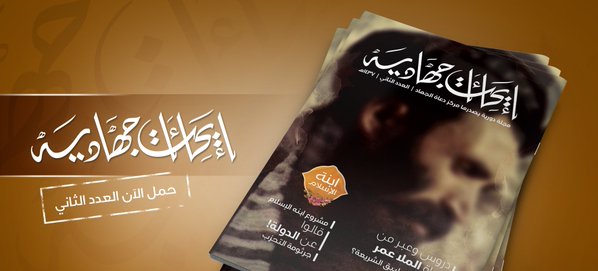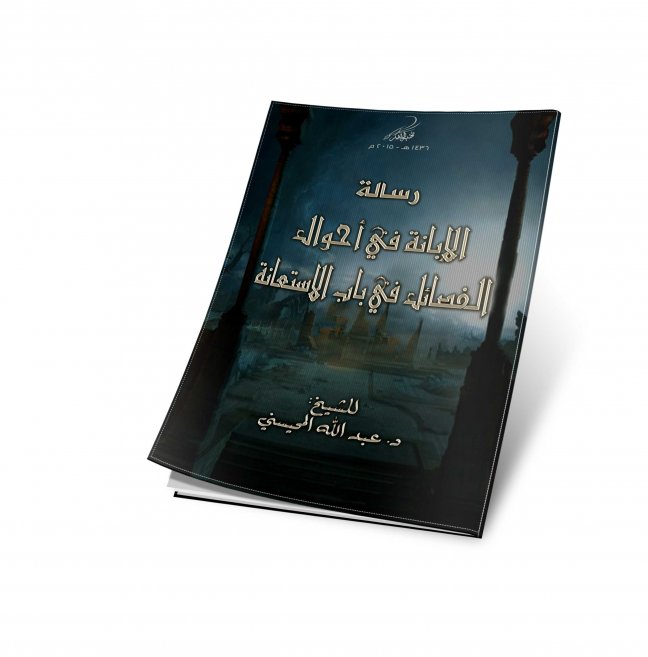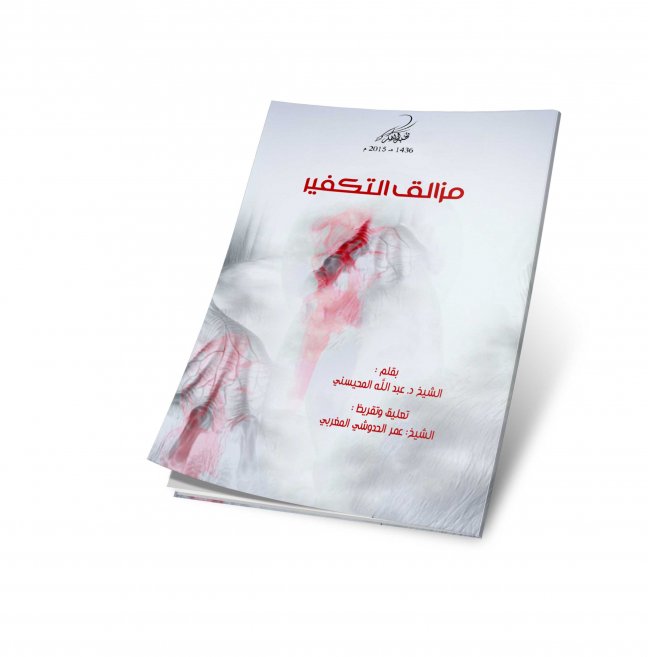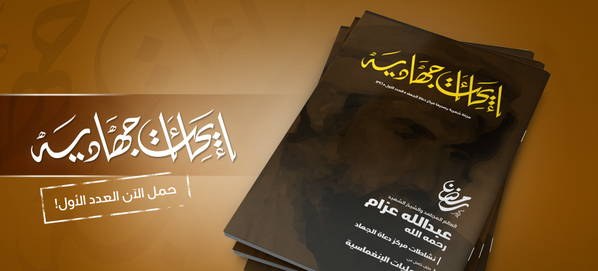Click here for the first issue.
—

Click the following link for a safe PDF copy: Īyyaḥā’āt Jihādīyyah Magazine #2
_______________________
To inquire about a translation for this magazine issue for a fee email: [email protected]
Category: Dr. ‘Abd Allah bin Muḥammad al-Muḥaysinī
Majmu’ah Nukhbat al-Fikr presents a new release from Dr. ‘Abd Allah bin Muḥammad al-Muḥaysinī: "The Explanation of the Factions Statuses in Relation to the Issue of Seeking Assistance"

Click the following link for a safe PDF copy: Dr. ‘Abd Allah bin Muḥammad al-Muḥaysinī — “The Explanation of the Factions Statuses in Relation to the Issue of Seeking Assistance”
_________________
To inquire about a translation for this release for a fee email: [email protected]
Majmu’ah Nukhbat al-Fikr presents a new release from Dr. 'Abd Allah bin Muḥammad al-Muḥaysinī: "The Pitfalls of Takfīr"

Click the following link for a safe PDF copy: Dr. ‘Abd Allah bin Muḥammad al-Muḥaysinī — “The Pitfalls of Takfīr”
_________________
To inquire about a translation for this release for a fee email: [email protected]
New statement from Majlis Shūrā Ahl al 'Ilm in al-Shām: "On the Killing of Shaykh Māzin Qasūm From the Village of Kufr Baṭīkh in Idlib Province"
Click the following link for a safe PDF copy: Majlis Shūrā Ahl al ‘Ilm in al-Shām — “On the Killing of Shaykh Māzin Qasūm From the Village of Kufr Baṭīkh in Idlib Province”
_________________
To inquire about a translation for this statement for a fee email: [email protected]
New statement from Muhājirī al-Shām: "About the Baghdādī Group"
Click the following link for a safe PDF copy: Muhājirī al-Shām — “About the Baghdādī Group”
________________
To inquire about a translation for this statement for a fee email: [email protected]
Mirkaz Du'āt al-Jihād presents a new magazine: "Īyyaḥā'āt Jihādīyyah #1"

Click the following link for a safe PDF copy: Īyyaḥā’āt Jihādīyyah Magazine #1
________________
To inquire about a translation for this magazine issue for a fee email: [email protected]
New release from Dr. 'Abd Allah bin Muḥammad al-Muḥaysinī: "The Fifth of Ramaḍān"
بسم الله الرحمن الرحيم
الحمد لله رب العالمين، والصلاة والسلام على أشرف الأنبياء والمرسلين، رب اشرح لي صدري ويسر لي أمري واحلل عقدة من لساني يفقهوا قولي..
هذا بيان مهم جداً أكتبه نصحا للأمة ليهلك من هلك عن بينه ويحيى من حيّ عن بينه، وأسال الله سبحانه وتعالى أن ينفع به كاتبه وقارئه، وقد تمت ترجمته إلى عدة لغات: الإنجليزية والروسية؛ والفرنسية والتركستانية .. لأهميته للمسلمين عامة وللمجاهدين في أقطار الأرض خاصة، أسميته: (الخامس من رمضان) وذلك لأن هذا اليوم هو يومٌ فارق في المتابعين لهذه القضية أعني: (قضية جماعة البغدادي)..
أما بالنسبة لي: فلم يكن هذا اليوم فارقاً عندي؛ حيث إن الأمر لدي في غاية الوضوح منذ أمد، ولكن ليس من رأى كمن سمع، فهذا اليوم يشكل فارقاً عند كل باحث للحق قد طالت حيرته ولم يتضح له الأمر في شأن (تنظيم البغدادي) لأجل جلد أنصارهم وقوة إصداراتهم، فكلما قلنا عنهم قولاً وبيَّناه للأمة ظهر أنصارهم يردّون وينافحون، مدعّمين ذلك بإصداراتهم القوية، فحار المستمع وقال: القضية بين طرفين، وقول الطرف لا بد له من بيّنة! وبدأ يبحث عن البينات، فجاءوه بادّعاءات ملفقة زورًا وبهتاناً، فحار أكثر الناس في الأمر، وآثر البعض السكوت والتوقف!
أما اليوم (الخامس من رمضان) فقد سقط بإذن الله القناع، وشاء الله سبحانه وتعالى أن يفضح متحدثهم ، على رؤوس الأشهاد في قضية جوهرية فارقة في الحكم على هذه الجماعة المارقة، أعني: قضية تكفيرهم للمسلمين بغير حق.
نعم لقد كنت منذ مباهلة العدناني وذكره أن لعنة الله عليه ، إن كانوا يكفرون من خالفهم كنت منذ ذلك الحين أنتظر سنة الله بفضحه ، وكنت على يقين من ذلك ولم أكن أظن أبداً أن يفضحه الله بعد سنة وبلسانه هو فسبحان الله ، له الحكمة البالغة !
وقد علم الجميع أن من أبرز صفات الخوارج قتلهم للمسلمين كما قال النبي صلى الله عليه وسلم: “يقتلون أهل الإسلام” وإنّ قتلهم للمسلمين يكون بتكفير لهم، فالصفات في الجماعات كما ذكر أهل العلم في الفرق والنِّحَل صفات مؤسسة، وصفات مشبهة، فالصفات المؤسسة: كوصف فرقة الخوارج بقتلهم أهل الإسلام واستباحتهم للدماء وتكفيرهم للمسلمين بغير حق، وما عدا ذلك فهي صفات مبينة وموضحة..
ولنقف عند هذه الصفة الخطيرة، وهي تكفيرهم للمسلمين بغير حق:
قد ذكرت قبل عام ونيف من هذه الكلمات أنني أشهد الله سبحانه وتعالى على موقف حصل لي شخصياً مع الرجل الثاني في تنظيمهم ألا وهو الأنباري، فقد دخلت عليه حين انطلقت شرارة القتال في ريف المهندسين في حلب وقلت له:
يا فلان! القتال بدأ يستعر، وإني أسألك بالله هل ترى جيش المجاهدين -وهو تجمع من تجمع الجيش الحر- هل تراهم مرتدين؟ إن كان الأمر كذلك فأبلغني حتى أتوقف عن السعي، فلا داعي لذلك!
فقال لي: والله لو نعلم عنهم ردة لأعلنَّاها.
فقلت له: ولكن حراسك والحواجز عند الباب تزعم أنهم مرتدون، فبيِّن!
فقال لي بالحرف الواحد: نحن أعلم متى نتكلم ومتى نصمت!!
فسكتُّ حينها وخرجت، وأُشهد الله على هذا الكلام..
فلما نشب القتال بينهم وبين الأحرار في مسكنه أعلنوا أنهم يرون ردة الأحرار بل ردة الجبهة الإسلامية!
ولما نشب القتال بينهم وبين جبهة النصرة في دير الزور وصفوا جبهة النصرة هنالك بالمرتدين! ولما نشب القتال في حلب وصفوا جبهة النصرة في حلب بالمرتدين!
ولما نشب القتال بينهم وبين جبهة النصرة بالقلمون وصفوا جبهة النصرة بالقلمون بأنهم مرتدين!
وهكذا كلما قاتلهم فصيل وصفوه بالردة، ولا حول ولا قوة إلا بالله..
واليوم لم يقاتلهم الأخوة في جند الأقصى ولا الأخوة في أنصار الدين، ولو أنهم قاتلوهم لوصفوهم بالردة، وستذكرون ما أقول لكم!
قد يقول قائل: ما دليلك على هذا الكلام؟ وأين برهانكم؟ فإنهم يقولون خلاف ذلك!
أقول: كان الأمر كذلك، أما اليوم بعد الخامس من رمضان فلا تسأل عن دليلي، فدونك إقرار متحدثهم الرسمي، فالإقرار سيد الأدلة كما هو معلوم عند أهل العلم..
أقول: إن الذي حدث في اليوم الخامس من رمضان -إي والله- علامة فارقة لكل صادق وأقول (صادق) من مناصريهم أو من باحث عن الحق في هذه القضية..
فما إن باهل متحدثهم ولعن نفسه قبل عام حتى أظهر الله الحق وفضح الله زيفه وكذبه على لسانه، وإن هذه لمن عجائب هذه المحنة التي حلت بالأمة الإسلامية!!
دعك من قولي وقول فلان بأن القضية اليوم في الخامس من رمضان قضية اعتقاد وتوحيد وتحريف في دين الله سبحانه وتعالى، فقبل عام من الآن ذكرتُ وذكر من قبلي آخرون أنهم يكفّرون من قاتلهم، وثار أتباعهم وأنصارهم ومؤيدونهم يكذّبون ذلك وينفونه، وخرج متحدثهم الرسمي ينكر ذلك، بل ويا للعجب يباهل ويلعن نفسه إن كانوا هم كذلك –أي: إن كانوا يكفرون من قاتلهم- وذلك في تسجيل أعلنه قبل عام من الآن بعنوان: (ثم نبتهل فنجعل لعنة الله على الكاذبين) فكان مما قال: “وزعموا أن الدولة ترى كل من قاتلها قد صار محارباً للإسلام خارجاً عن الملة، وأنها تكفّر باللوازم والشبهات والاحتمالات والمآلات”، ثم قال: “اللهم إني أُشهدك أن هذا كذب وافتراء، وأنه ليس منهجًا تعتقد به، اللهم من كان كاذباً فاجعل عليه لعنتك وأرنا فيه آيتك”.
ثم بعد هذا التسجيل وهذا الكلمات من هذا المتحدث -عليه من الله ما يستحق- خرج لنا في (الخامس من رمضان في عام 1436ه) يقول في تسجيل بعنوان: (يا قومنا أجيبوا داعي الله) فقال ما نصه: “فاحذر؛ فإنك بقتال الدولة الإسلامية تقع بالكفر من حيث تدري أو لا تدري” فيا لله!! إنها عبارة عظيمة تهتز لهولها الجبال، أن يكفّر كل من قاتل دولته وباهل ولعن نفسه قبل عام إن كانوا يقولون بمثل هذا القول، ونحن نقول: آمين.. اللهم آمين..
وأنتم فأمِّنوا أيها المسلمون! وأيُّ دليل ترجو بعد هذا أيها المناصر الصادق، يا من ما زلت متردداً في شأنهم من الجماعات المجاهدة من العرب والعجم في مشرق الأرض ومغربها..
أقول: إني لأحسب والله أن من سمع هذا الكلام الخطير في تكفيرهم وقتلهم، وتيقّن من ذلك، وهو يعلم ما معنى خطورة التكفير بمثل هذا التعميم، ثم لم يحسم أمره ولم يتغير موقفه من ذلك فإني أحسب ما منعه من ذلك إلا الهوى، فقد علمنا أن نواقض الإسلام عشرة، وهؤلاء قد أضافوا ناقضًا آخر من نواقض الإسلام! فأي هدم وأي تحريف للعقيدة والتوحيد ولدين الله سبحانه وتعالى ولملة إبراهيم جاء به هؤلاء؟!
نعم والله! لقد كان اليوم الخامس من رمضان علامة فارقة لكل باحث عن الحق والله المستعان، أقول بعد ذلك: يا من تناصر هؤلاء أو تشك في أمرهم وتتردد في شأنهم دونك ما ذكرتُ آنفاً، وإني أقول: إني أُشهد الله أني ما رأيت جماعة أسوأ خُلقًا ولا أبعد عن هدي النبي صلى الله عليه وسلم من هذه الجماعة، فقد خالفنا أعداء الدين من الرافضة والنصيرية وغيرهم، وقاتلناهم وأثخنَّا فيهم، فوالله ما سمعنا سباباً
New Fatwā from Shaykh Abū Qatādah al-Filisṭīnī, Shaykh Abū Muḥammad al-Maqdisī, Dr. Sāmī al 'Uraydī, Shaykh Abū Sulaymān al-Ustrālī, Dr. 'Abd Allah al-Muḥaysinī, et al: "Fatwā"
Click the following link for a safe PDF copy: Shaykh Abū Qatādah al-Filisṭīnī, Shaykh Abū Muḥammad al-Maqdisī, Dr. Sāmī al ‘Uraydī, Shaykh Abū Sulaymān al-Ustrālī, Dr. ‘Abd Allah al-Muḥaysinī, et al — “Fatwā”
_____________
To inquire about a translation for this statement for a fee email: [email protected]
GUEST POST: The Syria Twitter Financiers Post-Sanctions
NOTE: As with all guest posts, the opinions expressed below are those of the guest author and they do not necessarily represent the views of this blogs administrator and does not at all represent his employer at the Washington Institute for Near East Policy.
Jihadology.net aims to not only provide primary sources for researchers and occasional analysis of them, but also to allow other young and upcoming students as well as established academics or policy wonks to contribute original analysis on issues related to jihadism. If you would like to contribute a piece, please email your idea/post to azelin [at] jihadology [dot] net.
Click here to see an archive of all guest posts.
—
The Syria Twitter Financiers Post-Sanctions
By Asher Berman
Introduction
A new type of financier supporting Islamist armed groups emerged during the initial years of the Syrian conflict. These Gulf-based financiers openly advertised their activities on social media, using the medium to attract donations from across the Gulf. In some cases, they publicly documented their successive trips to Syria and meetings with prominent Islamist rebel leaders, which made them celebrities in the Islamist Twitter scene. One particularly prominent network of financiers was associated with the Umma Party, a Salafist opposition movement that was started in Kuwait in 2008 and spread to other Gulf countries during the Arab Spring. Other financiers worked independently or banded together to form joint fundraising campaigns.
The international community moved slowly to neutralize these financiers, but in August 2014, the US government sanctioned two of the most prominent individuals, Hajaj al-Ajmi and Shafi al-Ajmi of Kuwait.i The UN also sanctioned Hajaj and Shafi, and Kuwait, through which most of the money was being funneled, passed laws designed to end the use of Kuwait as a weigh station for money moving to terrorist groups abroad.ii,iii,iv The financiers, both sanctioned and unsanctioned, have greatly curtailed their activities since August 2014 and have seen their celebrity diminished. Those who are still active use social media to fundraise for humanitarian projects in Syria and are no longer publicly supporting armed groups. The one exception is ‘Abdullah al-Muheisini, who is unique in that he left the Gulf and lives inside Syria fulltime. Although the sanctions announced in August 2014 did not target all of the individuals publicly fundraising for Islamist armed groups in Syria, it did create a new environment in the Gulf in which these activities are no longer being tolerated and seem to have stopped. The one exception, al-Muheisini, lives in Syria and is therefore not subject to the same governmental pressures as Gulf-based financiers.
The Financiers:
Hajaj al-Ajmi: Hajaj al-Ajmi was a relative unknown prior to the start of the Syrian conflict in 2011, but he skillfully used social media to attract attention by documenting his successive trips to Syria, and quickly became well known in the Middle East. After the US announced sanctions targeting Hajaj, Twitter shutdown his account. Hajaj quickly created a new account and a hashtag was circulate called “#Campaign_for_a_million_followers_for_Hajaj_al-Ajmi” which helped him regain roughly 100,000 followers of the nearly 500,000 that he had pre-sanctions.v Hajaj, still an active social media user, seems to feel that the sanctions are unfair, recently complaining on Twitter that members of the Kuwaiti parliament continue to support the al-Assad regime without consequence, while he was sanctioned and can no longer engage in normal business activities.vi Hajaj appears to be struggling to adapt to life under sanctions. He told an interviewer that he is trying to work in the perfume business but cannot get the government to register a car or business in his name.vii His contacts in Qatar reportedly invited him to work with them, for which Hajaj expressed his appreciation on Twitter, but regretfully declined the offer due to an ongoing travel ban.viii
Although Hajaj was sanctioned by the US and the UN, sanctions did not target the charity that he ran and utilized to fundraise for armed groups in Syria, al-Haiah al-Sh’abiyah l-D’am al-Thawrah al-Suriyah (The Popular Commission to Support the Syrian Revolution), nor his partner in running the charity, Umma Party member Irshid al-Harji. The charity remains operational under al-Hajri’s leadership, but has changed its name to al-Haiah Zakat al-Sh’abiyah (The Popular Charity Commission).ix,x Despite the name change, the charity is using the same logo, Twitter account, and directs donors to the same address in Kuwait’s Aqilah neighborhood as prior to August 2014.xi,xii The organization now focuses on distributing relief in Syria, and recently delivered supplies to Syrians in Idlib and Lattakia Provinces in cooperation with the Umma Party’s Istanbul office.xiii
Muhamed al-Mufrih: Muhamed al-Mufrih was a Saudi-Arabian financier and head of the Saudi branch of the Umma Party, which formed in 2011 at the beginning of the Arab Spring. Saudi authorities, who do not permit organized opposition movements, quickly arrested the Umma Party leadership, but al-Mufrih was able to flee the country, surfacing in Istanbul. During the Syrian revolution al-Mufrih appears to have played an important role in the constellation of Umma Party-associated financiers, accompanying Hajaj al-Ajmi on trips inside Syria and dedicating an Umma Brigade training camp in honor of a United Arab Emirates Umma Party leader who was killed while fighting with Ahrar al-Sham.xiv,xv
Al-Mufrih died in December 2014 following a sudden and mysterious illness. Hakim al-Matiri, founder of the Umma Party, characterized al-Mufrih’s death as an assassination-by-poisoning, which was understood as an accusation aimed at the Saudi Arabian government.xvi The possibility of al-Mufrih getting assassinated was on the minds of the Ummah party leadership prior to his death in December 2014 due to assaults targeting al-Mufrih that occurred earlier in 2014 in Istanbul. The Umma Party responded to the preceding assaults by publishing a public letter to Turkish officials in May 2014 calling on the Turkish state to protect al-Mufrih from assassination.xvii
Al-Matiri’s eulogy for al-Mufrih provided greater detail on al-Mufrih’s role in financing Islamist groups in Syria. Al-Matiri cited al-Mufrih’s early involvement in the Syrian revolution, praising him for working with Abu Abdul Aziz al-Qatari in 2011 to support Ahrar al-Sham, a Salafist armed group that operates alongside al-Qaeda’s Jabhat al-Nusrah, while it was in its formative stages. Al-Qatari was a veteran of the Afghan Jihad in the 1980s and was known for being close with Jabhat al-Nusrah. He founded and led Jund al-Aqsa, a jihadist group based in Idlib Province, until he was captured and killed in 2014 by the Syrian Revolutionaries Front.
GUEST POST: Abdullah al-Muheisini Weighs in on Killing of Alawite Women and Children
NOTE: As with all guest posts, the opinions expressed below are those of the guest author and they do not necessarily represent the views of this blogs administrator and does not at all represent his employer at the Washington Institute for Near East Policy.
Jihadology.net aims to not only provide primary sources for researchers and occasional analysis of them, but also to allow other young and upcoming students as well as established academics or policy wonks to contribute original analysis on issues related to jihadism. If you would like to contribute a piece, please email your idea/post to azelin [at] jihadology [dot] net.
Click here to see an archive of all guest posts.
—
Abdullah al-Muheisini Weighs in on Killing of Alawite Women and Children
By Sam Heller
With Syria’s advancing northern rebels poised to strike into heretofore safe regime strongholds in Lattakia and Hama, jihadist evangelist and fundraiser Abdullah al-Muheisini has weighed in on the permissibility of killing Alawite women and children via a ruling published on Twitter.
Syria’s northern rebels recently captured the city of Jisr al-Shughour, Idlib – a strategic crossroads in Syria’s northwest – and are now positioned to both consolidate their hold on this corner of the country and push further south and west into regime territory. This means that Alawite towns, including the coastal Alawite heartland, may now be in jeopardy. Though some of this talk is undoubtedly bluster, some rebels are now threatening to move on Alawite mountain villages in Lattakia, including the al-Assad family home of al-Qardaha. The head of the powerful Salafist militia Ahrar al-Sham Hisham “Abu Jaber” al-Sheikh, for example, has expressed the hope that the “wave of purification” that swept the “filth” from Jisr al-Shughour reaches “the mountains of the Nuseiriyyah [derog., Alawites].”
In anticipation of rebels’ capture of Alawite or mixed areas, al-Muheisini has ruled that it is generally impermissible to kill Alawite women and children. (Al-Muheisini’s tweets are translated below.) He argues against those pushing for rebels to respond to the regime’s mass murder of Sunni women and children in kind. He says that the religiously sanctioned principle of reciprocity or response in kind does not allow rebels to kill women and children, which is forbidden and which the Prophet Muhammad was himself known to discourage. He also rules against killing Alawite women and children as a deterrent to the regime, saying that the regime doesn’t care about Alawite civilians and that this “will only increase the regime’s criminality and barbarity.”
Yet taken as a whole, al-Muheisini’s verdict should not be considered encouraging, particularly when considered with the coda of tweets he added immediately after (also translated below). In the main ruling, for example, he does not rule out captured Alawite women’s subsequent execution for apostasy. Nor does he rule out the killing of women and children who bear arms, the justification with which Ahrar al-Sham argued against Human Rights Watch’s allegations of massacres of Alawite civilians in an August 2013 Lattakia offensive. Most obviously alarming, though, is his assertion in one of his follow-on tweets that – even though the mujahideen may spare Alawite women and children – “we will exterminate their men.” (Al-Muheisini actually uses the verb أباد/abad, which is frequently used for “exterminating,” to take one example, insects. When modified with the Arabic word for “collective” – جماعي/jama’i – the resulting term, إبادة جماعية/ibadah jama’iyyah, is the common Arabic translation for “genocide.”)
Al-Muheisini, a Saudi now roaming northwest Syria, should not be treated as fringe or irrelevant. Though often seen as close with Jabhat al-Nusrah, he seems to maintain strong relations with an array of Islamist and jihadist factions and to serve as an influential dealmaker. Their robust Twitter presence notwithstanding, jihadists are not the sum total of Syria’s rebel forces. But in large swathes of Syria’s Idlib-centered northwest, jihadists (like Jabhat al-Nusrah) and jihadist-variants (like Ahrar al-Sham) are ascendant. With nationalist rivals either stamped out or sublimated, this hardcore often exercises effective control of rebel-held territory. In this more extreme northwestern milieu, al-Muheisini is closer to the rebels’ center than one might like – for example, he sat on the shari’ah committee of “Jeish al-Fath,” the operations room/coalition of Islamist brigades that captured Idlib City in March.
Moreover, al-Muheisini apparently doesn’t even represent the rightmost wing of non-ISIS rebels and jihadists on this issue. Jabhat al-Nusrah shari’ah official “Abu Osama al-Ansari,” for example, replied to al-Muheisini to say that Alawite women have fought or incited against the rebels and should be treated as combatants unless proven otherwise. (He argued, in addition, that al-Muheisini understated the degree of scholarly consensus on the execution of female apostates. His tweets are also translated below.)
Al-Muheisini’s verdict would be problematic even if we could expect it to be universally binding, a real constraint on rebel and jihadist footsoldiers, which likely isn’t the case. But the fact that al-Muheisini speaks for a not-inconsiderable segment of northern rebel forces – and may in fact be a sort of jihadist liberal on this, more dovish than some – is obviously reason for concern. It remains to be seen if energized rebels can actually realize the regime-shaking gains some are envisioning, or if the regime will rebound and drive them back. But if rebels and jihadists drive into heavily Alawite areas, the prospect of atrocities seems real and ought to be alarming.
Abdullah al-Muheisini’s original tweets (hyperlinked references added):
There’s an important matter about which I’d like to speak, given the mujahideen’s need for [this discussion], and particularly in this advanced stage of the jihad in al-Sham (Syria): the matter of #The_Verdict_on_the_Alawites’_Women_and_Children. The coming battles, God willing, will be in the heart of the regime’s strongholds, in Alawite villages, which is a new development on the field of Syrian jihad. And so today we raid the Nuseiriyyah (derog., Alawites), with God’s grace and blessing, and thanks to the mujahideen, the lives and blood they have sacrificed.
And so I wanted to clarify this extremely important matter, as, in a war in the Alawites’ villages, women and children fall into the hands of the mujahideen. So what is the verdict on them?
To go into detail on this matter – that is, the verdict on the Alawites’ women and children – we say:
First: The basic principle on the killing of infidels’ women and children generally is that it is legally impermissible. For it is reported in the Sahih [authoritative collections of the Prophet’s sayings and actions] that a woman was found killed on one of the Prophet’s (peace be upon him) expeditions, and the Prophet condemned that and discouraged the killing of women and children. [Al-Imam] al-Nawawi said: “The ulama [scholars] have agreed on forbidding the killing of women and children if they have not engaged in combat. If they did engage in combat, then the consensus of the ulama says: let them be killed.”
Second: Some may justify the permission of killing the infidels’ women and children with the ayah [Quranic verse]: “And whosoever transgresses against you, may you transgress likewise against him.” [2:194, Surat al-Baqarah] The reply to that is twofold: First, the symmetry of punishment in God’s saying, “May you transgress likewise against him,” refers specifically to what is not [religiously] forbidden. So it is not correct, for example, to commit adultery with the female relative of someone who committed adultery with your female relative on the grounds that it is like treatment. This rule of like treatment, therefore, is not unbounded. So it is not permissible to act according to the ayah without restriction and without referring to what the [Divine] Legislator excepted, what He designated as, in itself, taboo, and to which He forbade a response in kind. So it is not permissible to respond to treachery with treachery, or a sin cannot be met with a sin. As it says in the hadiths [Prophetic sayings]: “Repay the trust of one who trusts you, [but] do not betray one who betrays you.” As [Muhammad] al-Shoukani said, “These hadiths indicate that it is not permissible to kill women and children in any circumstance, and that is [the conclusion] at which Malik [ibn Anas] and [Abdul-Rahman] al-Awza’i arrived.”
As for [the killing of Alawite women
